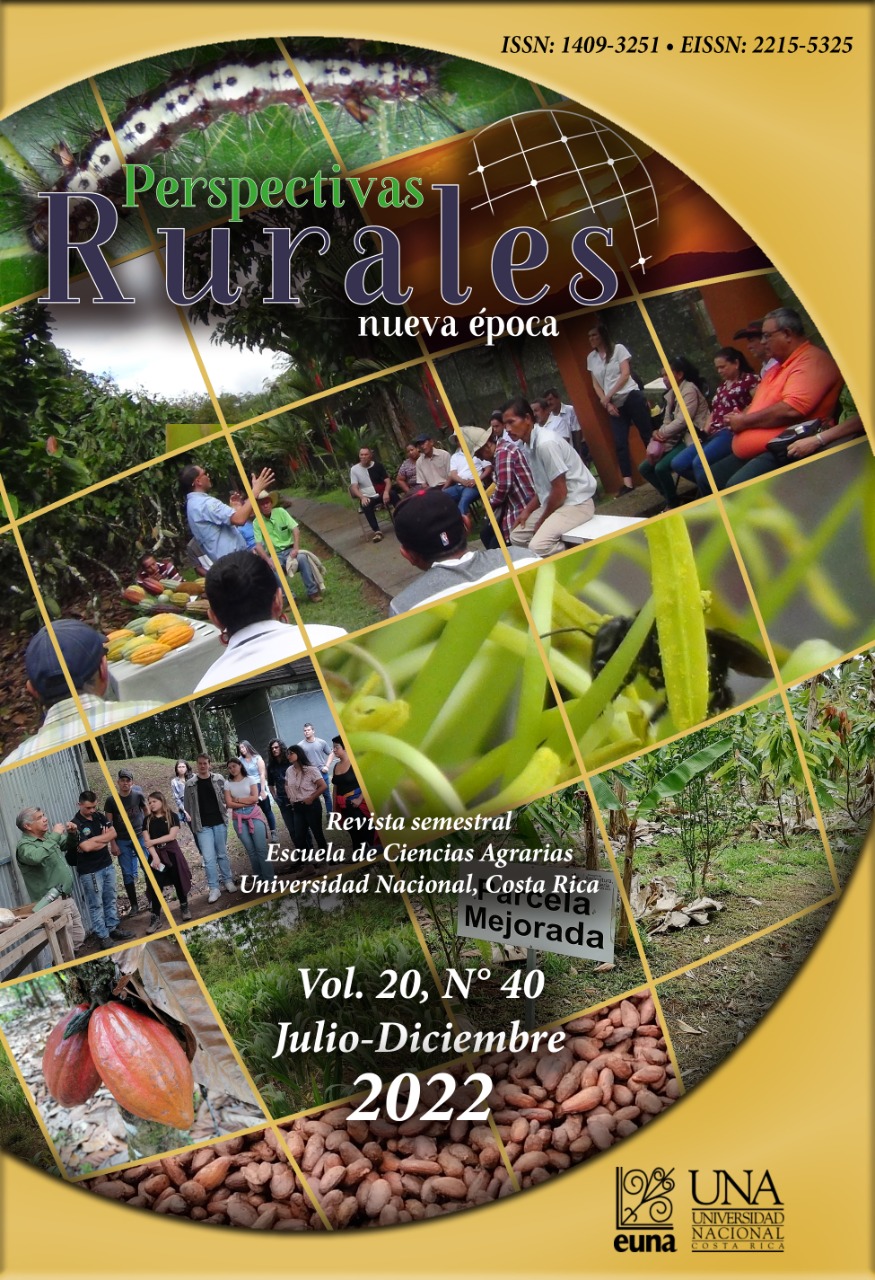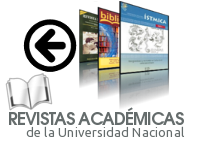Participatory methodologies and productive projects to encourage solutions to the problems of Localidad 20 de Sumapaz, Bogotá, in the framework of the Peasant School for Community Manager Leaders strategy of the Observatory of Food and Nutrition Sovereign
DOI:
https://doi.org/10.15359/prne.20-40.3Keywords:
Food sovereingty, Sustainability, Empowerment, Innovation, Autonomy, Knowledge, Peasant network, Productive projects and associationsAbstract
This paper is the continuation of the first phase of the project Peasant School for Community Manager Leaders (Escuela Campesina de Líderes Gestores Comunitarios de Sumapaz-ECLGC) conducted during the 2014-2019 period. The strategy was to provide the peasant school beneficiaries with knowledge related to food and nutritional sovereignty and security, family eating patterns, and food production techniques.
The most significant results were related to benefits for the population, such as acquiring and practicing knowledge in balanced eating habits, environmental care, production of diversified home gardens, prevention of chronic diseases, improving child nutrition, and territory characterization.
This article highlights the formulation and establishment of productive projects of each of the beneficiaries, mapping the main actors involved in the locality and determining the main problems affecting the population and possible solutions proposed by the community. This allowed the population involved to be empowered and own the solutions to their problems and needs.
However, there are still many conditions that need to be improved, including greater integration of peasants and more favorable ways to trade their products. Finally, proposals for sustainable management and management of resources were presented, highlighting the beneficiaries as the main characters of their own development in key aspects of food security.
References
Abramo, L., Cecchini, S. y Morales, B. (2019). Programas sociales, superación de la pobreza e inclusión laboral. En Aprendizajes desde América Latina y el Caribe (pp. 35-43). Libros de la CEPAL, n.° 155 (LC/PUB.2019/5-P). Comisión Económica para América Latina y el Caribe (CEPAL). URL https://repositorio.cepal.org/bitstream/handle/11362/44602/1/S1900005_es.pdf
Antón, E. G. (2014). Reconstrucción post-conflicto desde lo rural y urbano: El caso de Sumapaz, la localidad 20 de Bogotá D. C. Conferencia conjunta FLACSO-ISA. Buenos Aires, Argentina: Facultad de Ciencias Económicas, Universidad de Buenos Aires, Buenos Aires, Argentina. Organizada por el Área de Relaciones Internacionales de FLACSO Argentina y la International Studies Association (ISA). URL https://is.gd/9cznHd
Medina y Ortega (2021). ¿Seguridad alimentaria, soberanía alimentaria o derecho a la alimentación? Estado de la cuestión. Cuadernos de Desarrollo Rural, Pontificia Universidad Javeriana, vol. 18, 2021. URL https://revistas.javeriana.edu.co/index.php/desarrolloRural/article/view/25419
Peña, A. y Morales, R. S. (2015). Informe de evaluación y seguimiento de la política pública de seguridad alimentaria y nutricional-PPSAN. Dirección de Estudios de Economía y Política Pública Controlaría de Bogotá. URL https://is.gd/FD0Yrd
Rodríguez Casallas, G. M. y Murcia Peñuela, C. D. (2014). Análisis de la configuración de la Zona de Reserva Campesina en Sumapaz, localidad 20 de Bogotá D. C. ¿Una herramienta en la exigibilidad de la soberanía alimentaria? Universidad Nacional de Colombia (pp. 124-145). URL https://www.alanrevista.org/ediciones/2015/suplemento-2/art-507/
Rodríguez-Espinosa, H, Ramírez-Gómez, C. J. y Restrepo-Betancur, L. F. (2016). Nuevas tendencias de la extensión rural para el desarrollo de capacidades de autogestión. Corpoica Ciencia Tecnología Agropecuaria, 17(1), 31-42, pp. 1-12. https://revistacta.agrosavia.co/index.php/revista/article/view/457/372
Torres, O. L. (2014). Análisis de una estrategia de política pública de seguridad alimentaria implementada en la localidad del Sumapaz. Universidad Militar Nueva Granada, pp. 4-32. URL https://is.gd/CS4aCX
Unzueta, A. y Guzmán, M. T. (2015). El desarrollo de capacidades como estrategia de cambio. Una experiencia colectiva de búsqueda de alternativas. Comunidad Comparte, España. Investigaciones Alboan, pp. 7-139. URL https://acortar.link/NBCFdE
Uribe, L. J., Fonseca, Z., López, H. A. y Ayala, D. (2014). Situación alimentaria y nutricional en Colombia bajo el enfoque de determinantes sociales. Boletín no. 001/2014, Ministerio de Salud y Protección Social. Organización de las Naciones Unidas para la Alimentación y la Agricultura-FAO. Convenio 507-2013. Observatorio de Seguridad Alimentaria y Nutricional (OSAN), pp 1 -14. URL https://is.gd/X162Z7
Weiler, A. M., Hergesheimer, C., Brisbois, B., Wittman, H., Yassi, A. y Spiegel, J. M. (2015). Food sovereignty, food security and health equity: A meta-narrative mapping exercise. Health Policy and Planning, 30(8), 1078-1092. URL https://doi.org/10.1093/heapol/czu109
Downloads
Published
How to Cite
Issue
Section
License
![]()
Revista Perspectivas Rurales. Nueva Época se encuentra bajo una licencia Creative Commons Reconocimiento-NoComercial-CompartirIgual 4.0 Internacional License.
Creado a partir de la obra en http://www.revistas.una.ac.cr/index.php/perspectivasrurales
Los autores/as que publiquen en esta revista aceptan las siguientes condiciones:
- Los autores/as conservan los derechos de autor y ceden a la revista el derecho de la primera publicación, con el trabajo registrado con la Licencia Creative Commons Atribución-NoComercial-CompartirIgual 4.0 Internacional, que permite a terceros utilizar lo publicado siempre que mencionen la autoría del trabajo y a la primera publicación en esta revista.
- Los autores/as pueden realizar otros acuerdos contractuales independientes y adicionales para la distribución no exclusiva de la versión del artículo publicado en esta revista (p. ej., incluirlo en un repositorio institucional o publicarlo en un libro) siempre que indiquen claramente que el trabajo se publicó por primera vez en esta revista.
- Se permite y recomienda a los autores/as a publicar su trabajo en Internet (por ejemplo en páginas institucionales o personales) antes y durante el proceso de revisión y publicación, ya que puede conducir a intercambios productivos y a una mayor y más rápida difusión del trabajo publicado.






 :
: 
